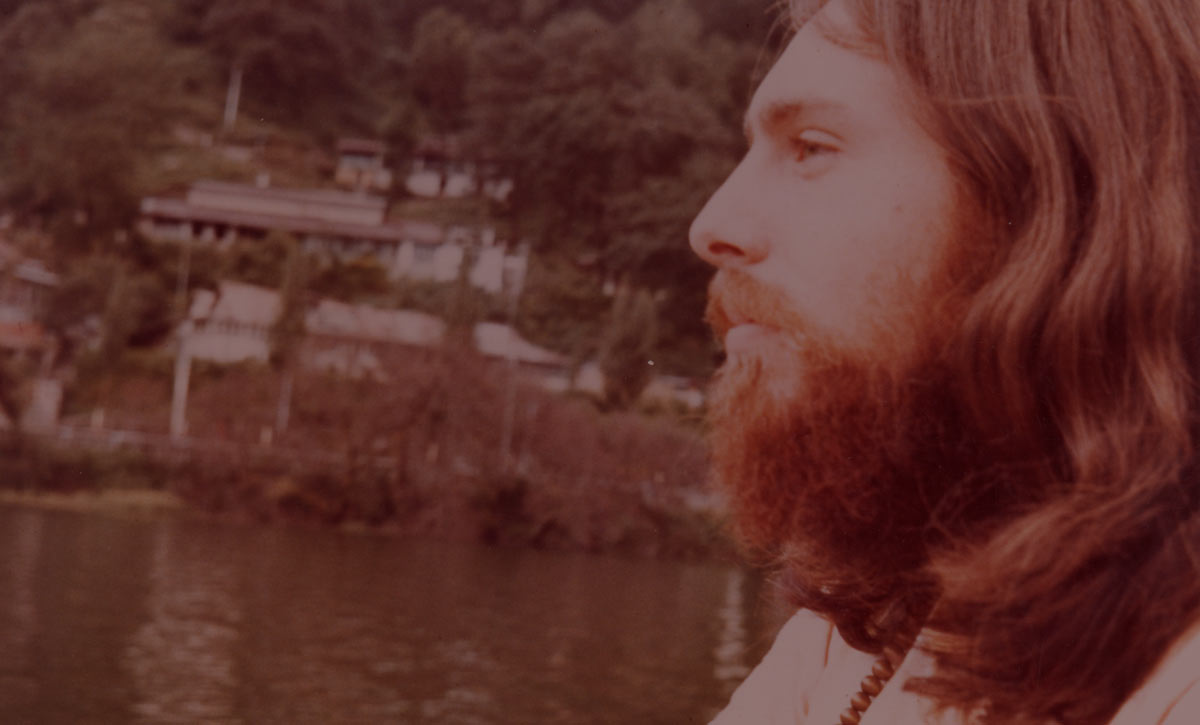
Podcast: Play in new window | Download
Subscribe: Apple Podcasts | Spotify | Amazon Music | Email | RSS
Call and Response Ep. 34 Trust In Your Self. Maharajji and Buddhism
When you talk about this incredible love, is it just the simple presence of consciousness that you can achieve through vipassana or different meditation techniques or is it something else? And if it is something else, how do you connect and experience that?
“As you sit and you go more deeply, you know, you shouldn’t think that you’re finished, just because you feel a little peace. That’s good. But you should be with that. You shouldn’t push it away or hold onto it. Be with whatever arises, right? And you’ll have many different experiences over time, lifetimes of practice. And whatever is, whatever your karma dictates, will come to you in the way that it’s supposed to.” – Krishna Das
Q: Thank you, Hi. I’m Dominique. It’s nice to meet you. I’m really enjoying my time here and
KD: It’s just been a few hours. You’ll get over it. Don’t worry.
Q: So far so good. But I’ve been meditating for a while and I come from more of a Buddhist background, and when I meditate, I do feel a great sense of peace and spaciousness and awareness within but when I hear you talk about Maharajji, I hear you talk about this kind of incredible love and this unconditional love and to be really honest, I don’t necessarily feel that when I meditate and I’m wondering how you connect with that kind of…
KD: I don’t feel when I meditate either. So… what can I tell you? But go ahead, sorry
Q: So, my, that’s kind of my question. When you talk about this incredible love, is it just the simple presence of consciousness that you can achieve through vipassana or different meditation techniques or is it something else? And if it is something else, how do you connect and experience that?
KD: Good question. Really good question.
Very good question.
Well because of my experiences, in my life, when I talk about love and talk about presence and being, in my consciousness that’s Maharajji to me. And because of my experiences, that’s the way I experience the love and the devotion and the caring and all that stuff and from that feeds me and then it goes out to other people as well. Because He’s, everybody’s included in that, it’s not just mine. You know? It’s just this feeling of presence and being, and that’s everywhere. And that’s Him for me. That’s who He is for me. So, you have to be with your experiences. And they say that the nature, our true nature is Satchidananda. Truth, Consciousness and disgusting Bliss, ridiculous amounts of ecstasy and happiness. That’s what they say. That’s who we are. So yes, the answer is, as you sit and you go more deeply, you know, you shouldn’t think that you’re finished, just because you feel a little peace. That’s good. But you should be with that. You shouldn’t push it away or hold onto it. Be with whatever arises, right? And you’ll have many different experiences over time, lifetimes of practice. And whatever is, whatever your karma dictates, will come to you in the way that it’s supposed to. So right now, you’re not feeling… I don’t feel any peace when I meditate, so how do you get that? All I feel is His absence because I’m a crazy emotional devotee and half the time He’s everywhere, the other half the time I can’t even find Him, so what can I tell you? It’s better you sit and be quiet and happy than be like me. So, it’s a trade-off. It’s a different path. You know Ramana Maharshi, who was one of the greatest saints who ever lived, he said, there’s two ways to go. Either you go the path of jnana, or wisdom, where you try to penetrate into your true nature through awareness and through meditative practice, or you surrender to God. That’s it. They both go to the same place, but they feel very different while you’re on that path but neither one of those things can actually be achieved through your personal will. You can’t surrender yourself. Love surrenders you when you melt down into it. But you can’t do that because the ego will never, will never surrender. Ramana Maharshi said, asking the mind or the ego to kill the ego is like asking the thief to be the policeman. There will be a lot of investigation, but no arrest will ever be made. So it’s, one path or the other or mix them up, whatever you want to do, the point is that, it’s a ripening process, the practices you do ripen you little by little, and as you ripen, you taste differently, you know? You’re a little sour and then you get a little sweeter, and then a little sweeter and a little sweeter. But it’s not you doing it, you know? Just be with what is, give yourself to whatever practice you’re doing. Give yourself to it as much as you can. Enter into it as deeply as you can and you have this thought, “Oh I’d like to feel that.” Really that’s just another thought, which is preventing you from being here. So, let it go. You keep letting go, whatever practice you’re doing, you have to keep letting go. What you will experience is a question of what karmas ripen when. That we have no say over. So, the best is to just be with whatever is. And if you feel interested in Him, there’s some books about Him you can read and you get a very strong hit of his presence from these stories, because that’s all there is. He didn’t spout sutras and texts. He just hung out and did all kinds of things and now there’s people that wrote books, stories about those times, you know? And you get a feel for who He is and His presence. When you’re thinking about Him like that, you feel something. It’s not something you can grab onto, you know? But you can feel it. Oh, that’s nice. Really this is just, what do they call that, some Buddhist terminology, a clinging mind, you got stuck in that thought, you wanted that, and you think you don’t have something so you want that. Let it go. Come back. You have to do that anyway. But if you feel interested in Him, you can read books about Him, you can get a sense of who He is with a feeling, not just intellectual sense, because you can’t read about Him and the things that happened around Him without being touched in some way. It’s just too incredible. You know? You know, even the old devotees, the Indian devotees, what they would do is, Maharajji would go into His room for the night, and they would sit up all night telling stories about Him, their experiences. That was their practice. They didn’t meditate. They didn’t chant. They didn’t do anything. They just entered into that. And they just, that’s how they remembered Him. It’s called remember. And that’s a practice. That’s a devotional practice. That’s like, gospel songs. And seeing, oh wow, Jesus met the woman at the well. Wow. What happened. So, it’s slightly different technique but you know, sometimes you feel like a nut, and sometimes you don’t. Ok?
Q: Can I ask a follow up question? Just a real quick, because I know that you all studied Buddhist meditation in Bodhgaya
KD: What all?
Q: You, Ram Das and all of you went, I believe, in the 70s to Bodhgaya and studied
KD: Yeah sure.
Q: So, what is the connection for you between what you learned there and what Maharajji taught?
KD: It’s all the same, however, I had hurt my knee, did I tell you this yesterday? Really ripped my knee up, stepped in a hole in Vrindavan and it was like this, so my friend helped me walk to the temple in the morning because I think I had to go to the hospital or something. I can’t walk. So, I limped all the way to the temple and we were forbidden to come to the temple before 4 o’clock. We weren’t supposed to come. This was like 8 in the morning. So, I limped into the temple with my buddy and Maharajji’s sitting in the middle of the courtyard, big empty space, and just, He’s sitting in the middle on this tucket, on this cot, and there’s one Indian guy sitting with Him. And I limp up, and I figure He’s going to say, “What’s up with you? Get out of here.” You know? I limp up and He kind of doesn’t say anything. He’s just sitting there. So, I sit down and I couldn’t even bend my leg, I had to put my leg straight out underneath His cot. I sat there for a few minutes and, oh yeah, ok, so, after a few minutes, He got up and He started walking to the back of the temple and that Indian guy walked with Him. He walked like a 2-year-old, so somebody would always take His hand and walk with Him. He would like bounce from one leg to the other, like this. So, the further away He got from where I was sitting, He started leaning on this guy, right? And Like Leaning on Him. Like He couldn’t walk. Like He was limping, you know? And I was looking and I said, “Oh my God, He’s taking on the karma of my knee” right? The second I thought that, He turned around and He ran back, plopped down on the tucket, looked at me and said, “You thought I was in pain? You wanted to help me? Good boy. That’s a good boy.” So, we’re sitting there later in the day and I keep thinking, so later in the day, He grabs my notebook and He starts going through my notebook. And this notebook had all these prayers from all the different traditions and everything, you know? He’s going through it like this and He stops, “What’s this?” And I look and I went, oh… it’s a Buddhist, I said, “It’s a Buddhist prayer” and expected to get like, “Jao Get out of here” right? He said, “Translate some.” So, I couldn’t but the Indian guy there, he translated some of the verses and Maharajji looks at me and He says, “Teek, correct. Very good.” What? Then He kept going through the book and He comes across a little picture of Himself. He says, “Who’s that?” I said, “Baba, it’s you.” “Ney. Buddha.” So, there you go. That’s the connection. He’s Buddha.
But and another thing happened. I don’t know if you know, have you seen this book called “Sometimes Brilliant”? Everybody should read that. Required reading. It’s a really phenomenal book. Maharajji actually created the situation where smallpox would be eradicated in India and He did that through this doctor, an American doctor that was with us, Doctor Larry Brilliant. And this was an incredible story and Larry finally wrote the whole story. It’s phenomenal. Why am I telling you that? So, Larry was, what they did was they went through all the villages in India and they inoculated everybody against smallpox. And then the next year they were going back through all the villages to make sure there were no outbreaks, and they went to visit His Holiness, the 16th Karmapa, the previous Karmapa, who was the head of one of the major sects of Tibetan Buddhism. A great Yogi. A great great great saint. So, they’re sitting with Him and talking and the Karmapa says, “Oh, the king of Sikhim is my devotee, he’ll write a letter, you can go anywhere you have to go.” So, then the Karmapa asked Larry, “What practice do you do? What do you do?” So, we never knew what to say when people ask us that, because it was just, with Maharajji, it was just come, eat, go. That was the whole thing. So, Larry instead took out a picture of Mahrajji and He showed it to the Karmapa and the Karmapa said “Oh, Bodhisattva. Great Bodhisattva. The teachings of all Bodhisattvas are the same, even if they appear different.” And then He pointed to His altar, where He had these statues, and He said, “You see those statues, they’re the statues of the Mahasiddhas, the great yogis that started, that brought the Buddhism to Tibet,” this kind of Vajrayana Buddhism. And He said, “Mahasiddha,” and He pointed to the picture of Mahasiddha, Maharajji. So, then the Karmapa, in Buddhism you take refuge, the refuge ceremony is one of the first things when you enter onto the path, when you take refuge in the Buddha, the Dharma and the Sangha, the Buddha, the Teachings and the Satsang, all the practitioners. So Karmapa asked Larry and his wife, Girija, if they wanted to take refuge, and they said, “sure,” so the next day there was a ceremony on the roof of the temple, and just before the ceremony started, Larry got nervous, and he said to the Karmapa and he said, “Your holiness, do I have to give up my Guru to take refuge?” The Karmapa looked at him like he was crazy. He said, “No. I’m going to offer you refuge in your guru. The same way I offer refuge in the Buddha. I’m going to offer you refuge in your path in the same way I offer refuge in the dharma. Same thing.” Same thing.
There’s only one thing going on here. Right? It looks different to different people but why get so upset about the whole thing? Well, because we’re human beings. But it’s all the same. Different paths have different requirements. And depending on your karmic predicaments, you’ll be attracted to one path or another. No problem. It doesn’t matter. Whatever you do. You can add a little bit of this, add a little bit of this, take out a little bit of that. You’re free to be happy. So just whatever you do is good. He said. We’ll see. But that’s what I’ve been taught and shown by Mahrajji that you know, He would just go, like this. What is that? What does it mean, Baba when you do that? He said, then He goes… We said, “Baba what does it mean when you do that?” He goes… “What does that mean?” He said, “Many names, many forms. All one.” It’s all one. Some people don’t like to hear that because they have real estate taxes they have to pay and so they need lots of devotees to cover the taxes and to pay for the fancy cars and the nice silk saris, you know, all that bullshit… they don’t like to hear that. That’s ok. They don’t have to. But there’s only one thing going on. We’re all part of that one Being. And the reason we have compassion is not because we, there’s no reason, do you need compassion to be nice to your foot? It’s a part of your body. You’re not going to hurt it. You’re going to be nice to it. There are no other beings. There are just other parts of the body of God. Or the body of whatever, the Universe. You don’t need a reason to be nice, to be compassionate. In fact, one of the things they always said, in Indian English, about Maharajji, they said, “He had no cause to be kind.” “He needed no cause to be kind.” That was His nature. That’s the nature of these great Saints who are in fact, Gods on Earth. God on Earth. They are kind and caring because they know the truth that it’s all, we’re all part of that one thing. So. And for as far as this particular part of the path, Mahrajji always said to us, “from repeating these Names, everything is accomplished.” Everything is brought to fullness and completion. That’s what we were qualified to do. That was our teaching. You know? That was, so that’s what I do. You do what you do. It’s ok. But that’s what He told me and the few minutes a day I remember it, I do it. The whole thing is finding your own way. That’s the path. Even if somebody tells you what to do, you have to feel it. You have to feel that it’s right for you, otherwise you won’t do it anyways. So, it’s all about finding, learning how to listen to your own heart, to your own intuition about things. Learning how to trust ourselves. That’s all it is. The whole path is only about that. And when you fully trust yourself, it’s a whole other ballgame.



